The Weekly Watch
A Swiss Watch
I've been in Switzerland the last three weeks. The natural beauty was the big draw, plus the great public transportation system designed for citizens and tourists. It is an interesting country...really a confederation of cantons, cultures, and languages - German, French, Italian, and Romansh. The CH designation of Switzerland comes from Confederation Helvetia. The Romans founded their province of Helvetia in current Switzerland in 15 BC. The idea of a country focused on neutrality in conflicts and solidarity among its disparate groups is appealing. It's often ranked as the happiest country on Earth. In part because it is one of the wealthiest (minimum salary is 3600 Swiss francs/month), in part because they provide public services and care for their citizens, and in part because it is so beautiful. So hop aboard and join me in my exploration.
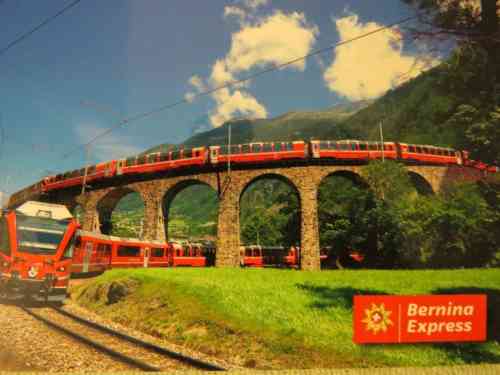
Please feel free to hop down midway to the travelogue if you prefer...
I'm starting this essay from home, and I've been reading a bit about the history in preparation. The ancients lived in pole structures along the lake shores. Later trails were cut through the mountains and trade slowly developed. Celtic groups left Southern Germany for current Switzerland in the 1st century BC. This tribe was known as the Helvetii. The Celtic population became assimilated into Roman civilization during the first two centuries of our era. Peace and prosperity reigned. The first passes were opened.
The peaceful period ended with the invasion of the Roman Empire by German Alemannians in 260. The Alps became temporary border provinces under military occupation. The Romans finally had to evacuate their alpine territories around the year 400. The Alemannians did not manage to conquer Rhaetia (the current canton of Graubünden in the SE corner). The Rhaetian Romans who lived here had been settled in parts of current Austria as well, and offered great resistance against the Alemannians. They managed to keep their territory and lived autonomously for a long time. At this point the language Rhaeto-Romanic came into existence, which still is spoken in Graubünden. The Alemannians occupied the West, where Christian Burgundians finally settled. The Burgundians adopted the language Latin from the Romans. In the South a similar process took place.
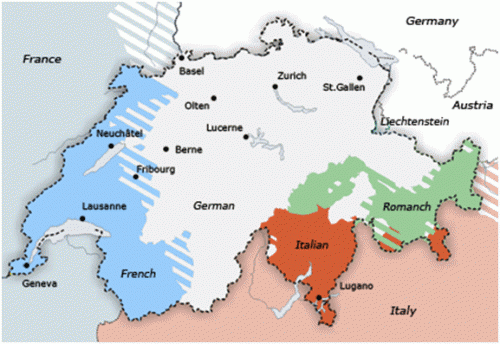
The four languages that are currently spoken in Switzerland came into existence around this time. The invasion of the Alemannians caused the North to become completely German-speaking around the year 900. In the West, vulgar Latin evolved into a French dialect. The South stuck to Latin which gradually developed into Italian. The separated Graubünden stuck to its Rhaeto-Romanic. The languages reflect the different cultures and explains why the country evolved into a regionally based government.
The Austrian Habsburg family eventually ruled over parts of the country, which resulted into a lot of resistance. This was the time of the folk hero, William Tell. When the emperor of Habsburg died, some regions took their chance and met to enter into a permanent alliance in order to become independent: the cantons of Schwyz, Unterwalden and Uri formed the Swiss Confederation on August 1, 1291. This event turned out to be the birth certificate of current Switzerland, and August 1 is still a national holiday which is celebrated annually.
The cantons of Luzern, Zürich, Glarus, Zug and Bern acceded to the confederation between 1332 and 1353, so that the end result was a confederation of 8 cantons. The successful confederation developed a tendency to expansion. It succeeded in ruling over Milan and the current canton of Ticino in 1513 and had entered into an alliance with Geneva and Graubünden.
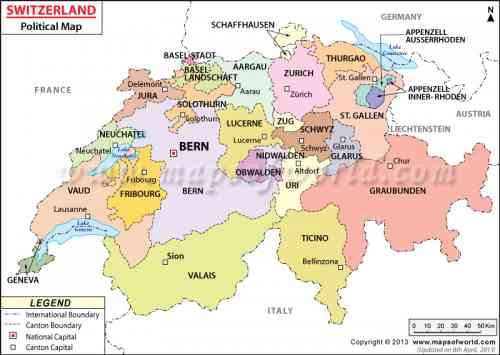
In 1515, the confederation lost a battle against a combined force of the French and Venetians. This setback resulted into a redefinition of the objectives: the confederation no longer aimed at expansion, and it declared itself to be a neutral state. It was laid down in a 'perpetual' treaty with the French, which is still the basis of Swiss policy today.
Switzerland's neutrality remained intact until 12 January 1798, when the French army, commanded by Napoleon, invaded the Swiss in the west. France was mainly interested in the alpine passes, since they were of strategic importance for a direct route from Paris to Milan. However, the Swiss were not easy to negotiate with, and the Frenchmen decided to withdraw their troops in 1803. Six new cantons were added to the confederation and three others followed in 1815. The cantons received the advantage of a great extent of independence, which was laid down in a treaty. The constitution of 1848 transformed Switzerland from a loose confederation into a unitary federal state. It is the oldest federal democracy in the world after the United States. The new constitution guaranteed freedom of domicile, freedom of religion, and internal trade barriers were lifted.
Switzerland mostly maintained its neutrality during the First World War between 1914 and 1918, although there were differing opinions among Swiss communities. The civilian army was mobilized which affected wages, while food prices doubled. There was a shift away from production towards services, which continues to be an important sector in Switzerland.
No European country remained truly neutral during WWII. Portugal, Spain, Sweden and Switzerland all worked to some extent with the Axis. In Switzerland, the people who lived through the war wanted to believe that it was their army and fortifications that kept the Nazis out. Historical research and documents clearly show that if the Nazis wanted to invade Switzerland, it would have been quick and relatively easy. The reason Germany spared its tiny neighbor to the south was because Switzerland proved much more useful as an independent state than as a satellite.
The Swiss made many useful weapon components (aluminium for the Luftwaffe, spark plugs for jeeps taken from the Russians, timing devices for bombs, among other things), and thus their factories were not bombed every night. The Swiss National bank bought gold from the Reichsbank, the Reichsbank was given Swiss francs which could be used internationally, and used them to buy cobalt, nickel and tungsten from the other “neutral” countries. The Turks, Portuguese, Spanish and Swedish, who were all under heavy pressure from the Allies not to accept direct gold payment from the Reichsbank, then exchanged the Swiss francs for gold. The problem was that the German gold came from the Belgian National bank reserves (not from concentration camps as some would have it) and the neutrals knew it.
Finally, the Swiss allowed trains to carry food and non-weapon supplies from Germany to Italy, with dozens of trains every day on their way to Africa. But did Switzerland have any other choice? Probably not. Totally surrounded by the Axis, most of its coal supply came from Germany every week, and all of its exports had to go through Axis controlled territory. For a landlocked country with few natural resources, this meant the Swiss had to work out some way to get along with their neighbors. The problem is that the postwar generations have been raised to believe that it was the Swiss army, and not the country’s usefulness to the Germans, that protected it from the wrath of war.
The industrialization of the country began between 1700 and 1800. The textile industry flourished in the northern and eastern parts of the country, while the watch- and clock-making industry developed in the west. The time piece industry allowed for independent, individual businesses. It made Switzerland the most highly industrialized country on the European continent. Railway building was a significant factor in order to be able to export products quickly. The amount of track was more than doubled between 1865 and 1885, and the major achievement was the opening of the Gotthard tunnel in 1880. Trains continue to be a primary means of transportation and most (80%) are powered by hydroelectric plants.
Government

The federal state is composed of 26 cantons. The canton's have a good bit of autonomy. Switzerland's government, parliament and courts are organized on three levels:
federal, cantonal (based on 26 cantonal constitutions), and communal (in a few small cantons and in some 2500 small villages reunions or meetings of all citizens are held instead of cantonal and communal parliaments; local courts are usually common to several communities).
The federal branch governs the areas of foreign relations, the army, customs examinations and tariffs, value added taxes and the legislation on currency, measure and weight, railways and communications to the confederation.
Only the cantons (and some major cities) have armed police forces, run hospitals and universities. Legislation on public schools is made by the cantons, resulting in 26 different education systems, but the public schools are actually run by the communes, much like many other public services (like water supply and garbage collection). The confederation, the cantons and the communes do collect income taxes to finances their affairs.
Switzerland's electorate has more rights of participation than in any other country and makes extensive use of them, but women's right to vote was introduced relatively late in Switzerland. Only in 1971, women got the right to vote on national level and the last canton was forced by the federal court to introduce it on cantonal and communal level as late as 1990.
The National Council is Switzerland's "house of representatives". The 200 members are elected every four years according to a refined proportional election system. The Council of States represents the cantons (like the U.S. senate). The executive branch is a team consisting of seven members with equal rights. Each member of the government acts as head of a department of the federal administration, but all major government decisions are taken in weekly government conferences either by consensus or by majority voting of all seven members. The members of Switzerland's federal government are usually (re-)elected every four years in December.
While the federal system can be found in many other countries like the U.S.A., Germany, Austria etc., and separation of powers (government, parliament, courts) are common to all democracies (or at least should be), referendums are rare in most other countries. In Switzerland's long tradition of Direct Democracy, frequent referendums do have a stabilizing influence on parliament and government. Ordinary citizens may propose changes to the constitution ("initiative"), if they can find a number of supporters (100,000 out of about 3,500,000 voters). Parliament will discuss it, probably propose an alternative and afterwards all citizens may decide in a referendum whether to accept the initiative, the alternate proposal or stay without change. So although there has been a rightward shift among their politicians (like much of the world), citizen referendums have held them in check. For example their politicians wanted to ease the ruling on where arms could be sold, but the people voted it down with a referendum.
Lookout's Swiss Travels
So the last couple of weeks I've written about how we are a product of time and place. Many of you have commented about the important effect of the people we have known...the who. And you are exactly correct. People do shape our lives and perspectives.
People are also a large part of a travel learning experience. We have met many interesting people on this trip. Among them a 101 year old man traveling independently ...slowly on a cane, but on his own. He is revisiting places of his youth where he skied as a young man. We met another 90 year old man from Germany. His experience with Hitler still shapes his world views today. The first question he asked me once he found I was from the states - "What do you think of North Korea? I think Mr. Trump is naive about the threat." He was not pleased with my answer that we were the threat in Korea...they (N & S) were trying to make peace. There was a Saudi woman who sat with us at a bus stop asking directions as her brother glowered at us. She was on her way to see the falls that drain the Eiger, Monch, and Jungfrau. "This I want to see", she said. I bet her desert perspective gave great significance to those rushing waters. We met many Brits and a few Indians, Filipinos, and Taiwanese. We've seen numerous crowds of Chinese and Japanese tourist herding together, carrying large bags, wearing fancy clothes and posing for glamour shots. But, perhaps my favorite comment was from a local gentleman about my age - "Americans need more political parties. All you have now is a choice between Pepsi or Coke." Pretty perceptive. So one of the big benefits of travel is experiencing the variety of perspectives, languages, and cultural mores.
However, my main reason for this essay is to emphasize the importance of HOW we spend our time. We find travel enriching. Now I admit travel is expensive. Especially flying across the pond. We create a travel savings fund. Some of you may remember our trip to Ireland a couple of years ago. It took us those two years to build our funds to cover this trip. We've learned how to travel inexpensively...even in a pricey place like Switzerland. We use B & B's, Hostels, Guest houses, and AirBnB apartments. We average about $100/night. We don't eat out often. We use grocery stores buying fruits, cheeses, breads, and some prepared foods like salads. We buy travel passes. For about $30/day we get rail and bus travel - hop on and off when the fancy strikes, and free admission to most museums. So that's the nuts and bolts of this trip. I'll elaborate more on this next week.
So what have we seen and learned. I can only share a bit of that so let me try to hit the highlights. I'll try to fill in some gaps next week. Let's start from the top...the top of the Jungfrau...
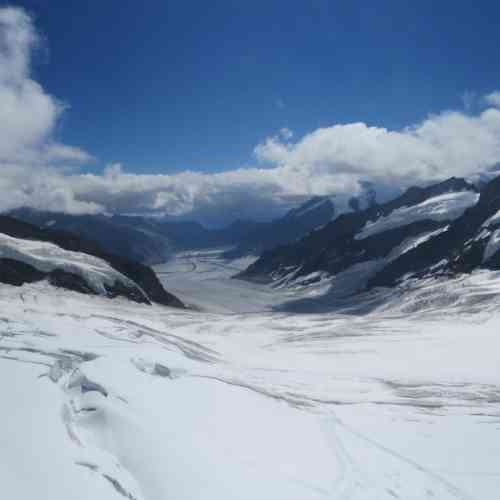
Part of the journey has been to see glaciers before they all melt...
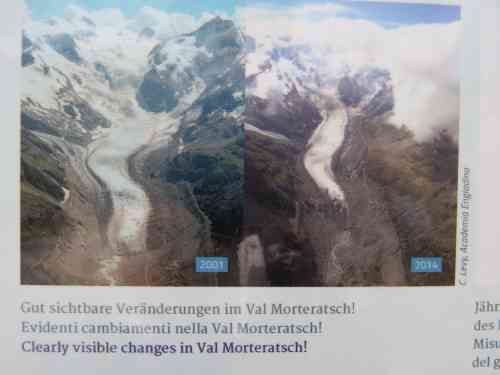
...and the Morteratsch glacier this week.
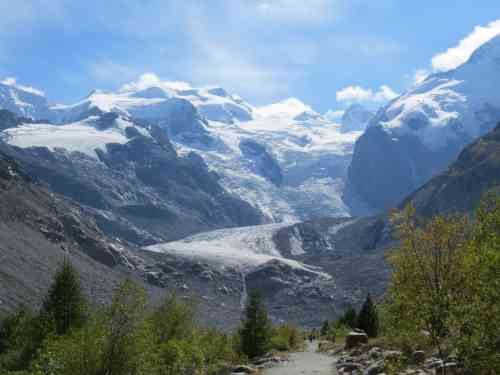
Nearby is the glacier in Vadret Pers
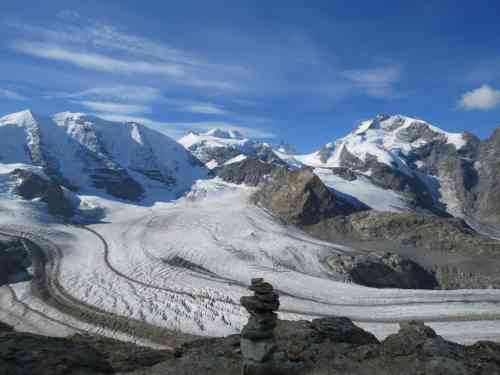
...and one more glacier to share, the Roseg.
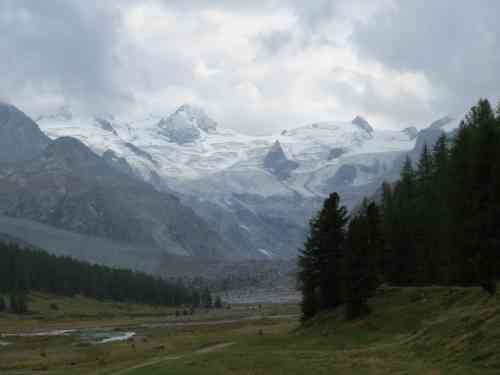
The Glacial melt water called Glacial milk flows throughout the country...
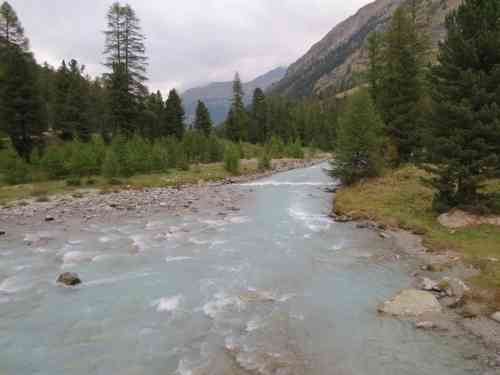
Creating beautiful mountain ringed lakes...
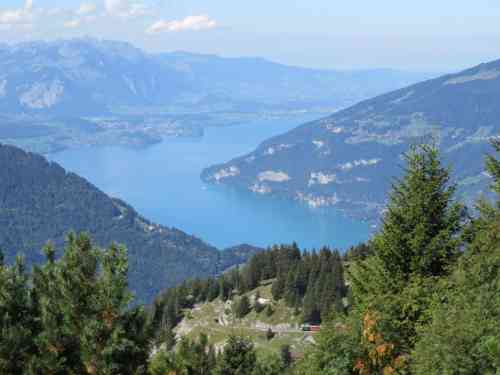
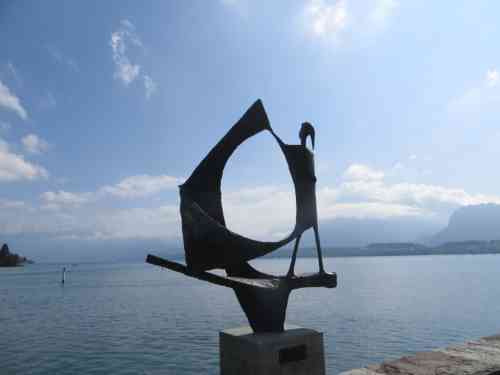
Many whose shores contain 1000 year old castles...
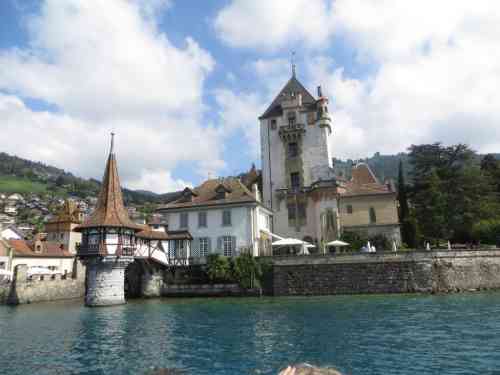
We spent a week in the car free village of Murren...
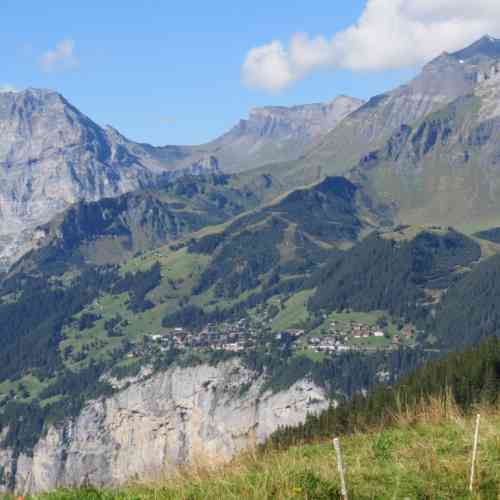
... above the valley that inspired Tolkien's Rivendale
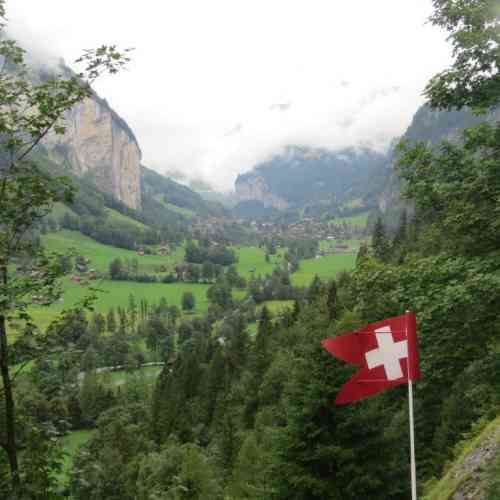
...and saw views like this almost daily
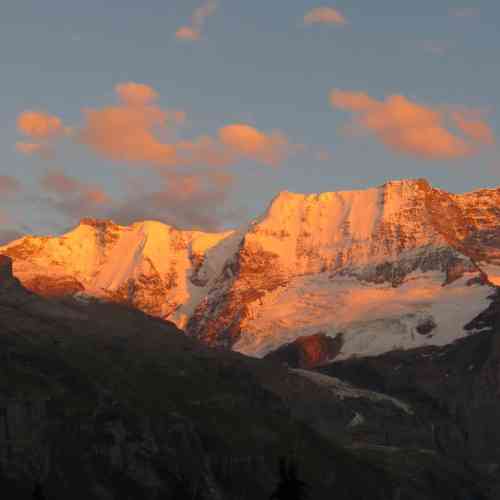
We hiked the historic Gemmi pass from the Roman spa town of Leukerbad to the alpine village of Kandersteg...following the footstep of Romans, Mark Twain, and Arthur Conan Doyle among many others...
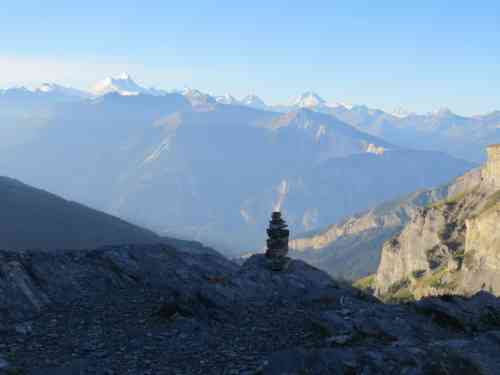
That's the Matterhorn toward the middle. This one -
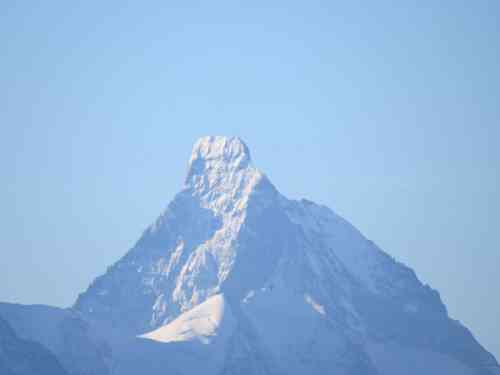
Here in the center of Bern is the clock that inspired Einstein to envision riding on a light beam looking back at this clock whose time didn't change...and traveling faster than light seeing time reverse.
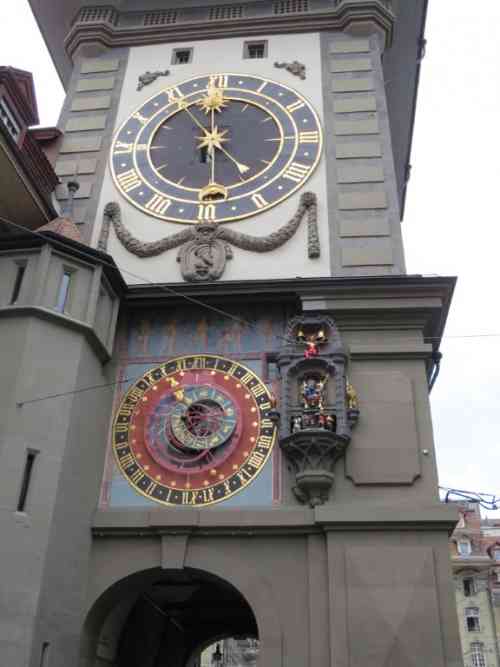
We experienced the French flavor in the town of Vevey on the shores of Lake Geneva (Lac Leman as it is called locally) were Charlie Chaplin made his European home...
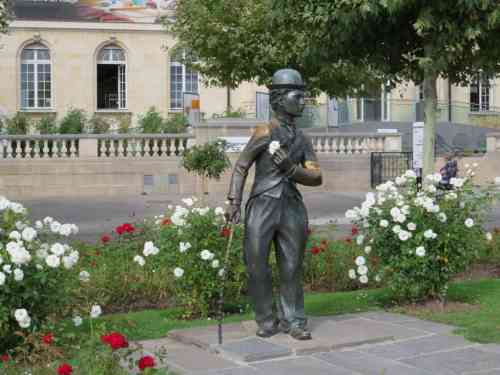
Along the shores are miles of vineyard dubbed as an UNESCO site.
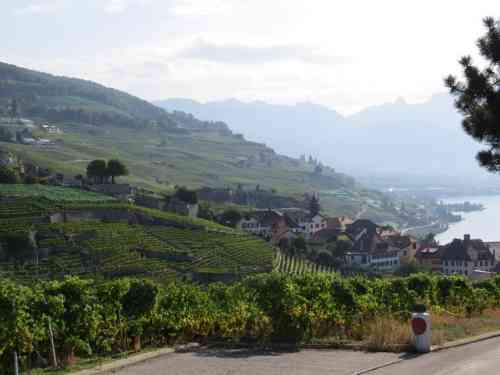
And, people spend early evenings on the shores to visit along the promenade...
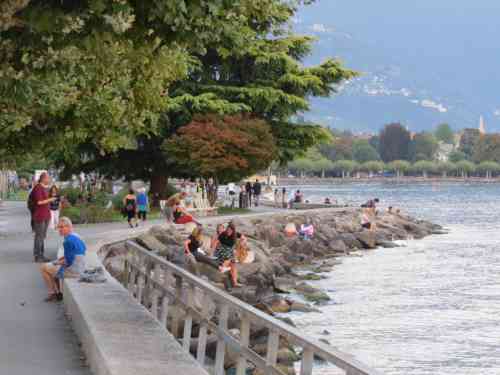
...and gather to watch the sunset.
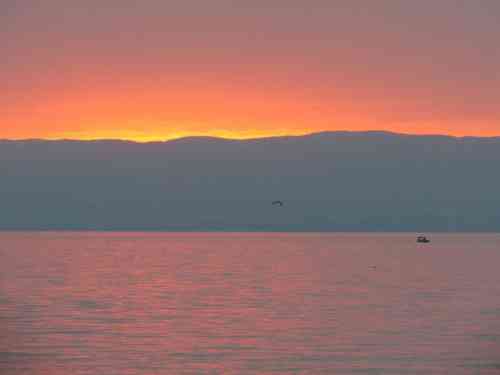
So as the sun sets I'll close out the piece wishing you all the best of travels where ever you roam. I hope you enjoyed this foray into central Europe with me, and I hope you might share some of your travel adventures in the comments below. Next week I'll cover the Italian area in southern Switzerland.
We often get caught up in the insanity of our country... obsessed with perpetual war and the promotion of fossil fuels, but there are still beautiful places on our planet. There are countries focused on their citizens rather than corporations. And perhaps most importantly, everywhere there are people of good heart and well meaning. Seek them out and find friendship and peace. From far away from home, I'm wishing you all a serene and fulfilling life.


Comments
Good Sunday morning, Lookout ~~
I've been meaning to comment the last two Sunday's, but I've had company both weekends, which didn't give me much time. Your piece last week brought back my late teen years, as I was 15 in 1967, when the hippie movement (which I heartily embraced) really came about. What I did then, the experiences I've had, and the people I've engaged with, in ensuing years, have definitely helped shape me. I can see who I am due to what I've been through and who I've been exposed to.
I also find that the universe sends me people I can help because of an experience I've had. Synergy is in play all the time.
Your trip looks incredible. Thank you for sharing. I look forward to reading your adventure unfold in the coming days.
Have a beautiful Sunday, everyone!
"The “jumpers” reminded us that one day we will all face only one choice and that is how we will die, not how we will live." Chris Hedges on 9/11
always a pleasure...
...to hear from you. People are our big resource, and company is good. I always liked Ben Franklin's line though...fish and company stink after 3 days.
We sometimes host a houseful and three days is a plenty. Hope you got in a nice visit with your friends. We still have a few more days here. Off to our last location tomorrow. Till next week, take care.
“Until justice rolls down like water and righteousness like a mighty stream.”
More Americans should travel outside the country at least once
I think it would make us a much better people. One of the big problems here in the US is that we are so insulated and isolated from the rest of the world that it tends to make us less caring about the rest of the people on this planet.
You trip to Switzerland sounds wonderful. It was a long time ago that I was there. My memories of Switzerland were of a country that was very beautiful, extremely clean, and expensive compared to the surrounding countries. The Swiss people seemed to be perfectionists in everything they do. At least that was my impression.
Enjoy your travels.
Do I hear the sound of guillotines being constructed?
“Those who make peaceful revolution impossible will make violent revolution inevitable." ~ President John F. Kennedy
Much like our country...
there is a big difference between north and south, east and west...attitudes and approaches. More on the Swiss people next week. Thanks for traveling along with me, and glad you were able to visit here too.
We went to an incredible fossil museum today and just returned. Off to dinner soon. So I might not reply to folks till tomorrow. Till then ...have a great day!
“Until justice rolls down like water and righteousness like a mighty stream.”
You have as wide open a heart as the outlooks you, Mr. Lookout
shared in this beautiful travellog diary. Can't wait for part II. I am curious to read what you have to say about the Swiss people.
I have one loved one in my family who got quite well-off and aloped and escaped to Switzerland to never return. (Not that appreciated by some) And I sent my eight-year-old son back in the days to a kid's summer camp near Lausanne at Lake Leman so that his French would become better. (Demanded by his teacher in French elementary school in Berlin, Germany).I visited him there and I was shocked about the quality of food they served the kids in the camp. Absolutely gorgeous for a camp. All my son though remembered was that the kids in the upper bunkbeds in the dormitory peed on him from above. I guess that wasn't quite 'french' ... may be more 'italian'...(no that's a prejudice), but my hunch is that it was a more 'allemanian' misbehavior.

Gruezi, lookout, you really had beautiful things to look at on your trip. I like to travel by train, you have the best conversations with strangers you meet. Love it. Thanks for sharing the photos.
https://www.euronews.com/live
meeting people on the train...
...is such fun. Wish I had better french, german and italian language skills. However almost everyone is educated enough to speak english here. I'm sorry as a teacher we don't do a better job with languages in our schools.
Thanks for reading and we'll visit more next week.
“Until justice rolls down like water and righteousness like a mighty stream.”
I wish that too, Lookout
If only we included in the curriculum, foreign language, or better yet languages. Begun in kindergarten, and continued until graduation would be ideal, imho. We're shortchanging our kids.
well, from my experience putting my child
from age three to fourteen through three different languages and countries (not necessarily because I wanted to, but it turned out that way), it's not that simple.
I had the feeling that the brain of a child picks up a new languages via hearing and develops a basic vocabulary accent-free. But for each language's increase in skills another language's skill decreases, with regard to the capability of speaking any of the languages the child is exposed to.
For written language skills, learning only one language's grammar and phonetics until at least puberty, is helpful managing another foreign language later on, though it won't be accent-free anymore.
I believe it is harder for English native speakers to pick up another language just because they don't have to. Most non-English speaking countries have English as their first foreign language in their school curriculumhen. If a native English speaker goes overseas into another country, most of the time he will meet folks, who speak basic English, which means the native English speaker hasn't the pain to go through structurally learn those foreign languages of the country he visits.
There is also a relation between your own native language's structure and the relative ease to learn English as a foreign language, because English grammar is 'easy-peasy' compared to French or German.
I was always amazed how much importance American English speakers put on the 'accent-free' spoken language skills. I don't care for accent-free speaking. Contrary I find those accents funny. My sister learned English from an Indian guy, I learned French from an African guy and we both speak English with a clear accent from those we learned to speak the languages from, but it was enough to survive in English speaking countries...
I like Americans' accent speaking French and German. Makes me smile. So, really accents are nice. I wouldn't want to miss them. It shows the stubborn rest of your origins. And what is so bad about that?

https://www.euronews.com/live
it's my understanding...
That there is no foreign accent if you learn a language before puberty. Thereafter, the language is actually stored in a different part of the brain...hence an accent.
http://pandora.cii.wwu.edu/vajda/ling201/test4materials/language_and_the...
Pretty interesting stuff...no wonder Chomsky is a linguist. Thanks for making me think about it.
“Until justice rolls down like water and righteousness like a mighty stream.”
To my surprise, I finally succeeded in learning to speak Dutch
and understand it fluently — after having tried unsuccessfully for thirty years using conventional methods (textbooks, courses, “language lab” type exercises) — by immersing myself “otaku”-style (= like a Japanese pop-culture fan) in Dutch media for kids (in particular, books for children or teens, the almost 40 years’ worth of songs by the non-profit pop group Kinderen voor Kinderen, and the Dutch TV news show for kids, NOS Jeugdjournaal).
Buuuuut, this breakthrough came with one big drawback — my ability to speak grammatically flawless German drastically declined.
Very similar to German in some ways, and grammatically much simpler and more “easy-going” than German in other ways, Dutch introduced a lot of crosstalk into my brain’s neural pathways for German.
One thing that trips me up a lot now is different gendering of nouns. “Number” and “idea” (Nummer/nummer, Idee/idee) are feminine in German but neuter in Dutch. “Choir” or “chorus” (Chor/koor) is masculine in German but neuter in Dutch.
missed your comment - just a little response belatedly
what I observed in myself and my son and co-workers of mine, all Germans, living in the US, some married to Americans, others not, is this:
When you are immersed in several languages as a child, you pick them up - all seemingly easy. Whatever is used most of the time (can be the language of the school you go to; can be the language of the country you live in, while it is not the same language you are learning at school and not the same language you speak at home; can be the language your parents speak at home, but the kid speaks it nowhere else in his envrionment) that languages sticks with you most.
What you lose, when immersed with two or more languages, can be picked up after being dormant for a long time much faster than any adult, who learned the language through books traditionally as an adult, would be able to. All this is only true for your spoken language. At least that is what I have seen the most often, especially in boys.
It does not work the same way for written language. And because what you can write is most important for your academic success in schools, it's to me much more important to learn systematically to write in one language during your school years from grade 1 to grade 10 than to learn several languages to speak even if you learn to speak them accent free.
Just saying. I am a little weird in that ...
https://www.euronews.com/live
Beautiful Switzerland, Lookout; memories flood through the blood
looking at your great photos. You are on to something good. We'll share stories, soon.
USians would be happier and the US would be richer
if we stayed out of wars, too. And even happier if every nation stayed out of wars.
Thank you for the post. Glad you enjoyed your stay.
Amen to that sentiment!
Our war economy (and fossil fuels too) is so shameful!
Thanks for dropping in and commenting.
“Until justice rolls down like water and righteousness like a mighty stream.”
My pleasure, and thank you.
Caucus 99% is so fortunate to have so many regular essayists who are so very intelligent and motivated.
Great photos and scenery
It amazed me at the age of 17 to be able to
have a beer in a pub one minute then to climb
the hills the next, such beauty and friendliness
all in one place.
I also loved the underground shopping in Zurich
and why I never returned even though I spent 6 years
in London I'll never know.
Maybe one day, maybe one day......enjoy heaven
Lookout for you are there.
I never knew that the term "Never Again" only pertained to
those born Jewish
"Antisemite used to be someone who didn't like Jews
now it's someone who Jews don't like"
Heard from Margaret Kimberley
your comment reminds me of the lyric....
"...it's closer here to heaven than it is back to the ground...Matterhorn.
[video:https://www.youtube.com/watch?v=hCw_cZqPjtM]
“Until justice rolls down like water and righteousness like a mighty stream.”
Yes the Mighty Matterhorn
back to the train when I first arrived we
went looking for the Hostel and a elderly lady
took us right to the front door, supposedly w/no
doubt, according to her it was completely onthe other
side of town, damn they were so friendly, one never
forgets that.
Again enjoy, are you going anywhere else in Europe?
I rec Prague if so, Copenhagen and Amsterdam also ++
I never knew that the term "Never Again" only pertained to
those born Jewish
"Antisemite used to be someone who didn't like Jews
now it's someone who Jews don't like"
Heard from Margaret Kimberley
Immigrating to Switzerland and becoming a Swiss citizen
https://www.swissinfo.ch/eng/becoming-a-citizen/29288376
https://www.sem.admin.ch/sem/en/home/themen/buergerrecht/faq.html
I would be hard pressed to replace my place
...of about 50 hectares anywhere else in the world. It is a much more admirable country here vs the US though.
You're nearby in Germany aren't you?
Well all the best!
“Until justice rolls down like water and righteousness like a mighty stream.”
Start on the 10 or 12 years of required residency at my age?
Well, I did have an aunt who lived to be 103 . . .
Another fabulous essay
Last week's and this week's essays are medicinal!
Thank you!
Marilyn
"Make dirt, not war." eyo
Thanks for reading!
“Until justice rolls down like water and righteousness like a mighty stream.”
Thank you for a lovely vicarous visit...
Brings back good memories of travels in Europe for me too. Hikes are things I remember the most of all. Then museums. What fun.
Stop Climate Change Silence - Start the Conversation
Hot Air Website, Twitter, Facebook
I remember traveling in the Canadian Rockys
Everyone's question was, "where are you hiking today?"
The variety of hikes here have been outstanding. More on that next week.
thanks for dropping by. I look forward to getting back to your column next week when I return. All the best.
“Until justice rolls down like water and righteousness like a mighty stream.”
I love canadians
outside in the winter hanging out at coffee shops in downtown Vancouver... no bad weather just bad equipment.
Stop Climate Change Silence - Start the Conversation
Hot Air Website, Twitter, Facebook
I will visit Basel in October
and Amsterdam in November.
In between is a few days on a river boat on the Rhine. Each day includes a guided tour of the port of call.
Guided by tour guides with decades of experience, usually the equivalent of a Master's Degree, and many gourmet meals included.
Can't wait to go!
"We'll know our disinformation program is complete when everything the American public believes is false." ---- William Casey, CIA Director, 1981
Sounds like a great trip!
I had a friend that biked the Rhine...sounded like fun too. We hope to see the Rhine falls this week...where the river originates flowing out of the Bodensee.
Wishing you good travels (especially if we don't cross tracks/threads between now and then).
“Until justice rolls down like water and righteousness like a mighty stream.”